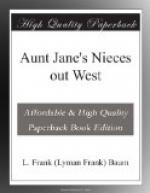“Your honor, this is the collection—the balance of it—which was stolen from the Countess Ahmberg!”
The judge looked at him a moment, leaned back in his chair and nodded his head impressively.
“What nonsense!” protested Colby. “These trays contain twice the number of pearls included in that entire list, as your honor may plainly see.”
“Of course,” retorted Le Drieux eagerly; “here are also the pearls from the necklace of Princess Lemoine, and the London collection of Lady Grandison. Your honor, in his audacity the defense has furnished us proof positive that this prisoner can be none other than the adventurer and clever thief, Jack Andrews.”
It was in vain that Colby declared these pearls had just come from Sangoa, where they were found. The judge cut him short and asked if he had any other evidence to advance.
“These pearls,” he added, indicating the trays, “I shall take possession of. They must remain in my custody until their owners claim them, or Captain Carg can prove they are the lawful property of the prisoner.”
Consternation now pervaded the ranks of the defense. The girls were absolutely dismayed, while Uncle John and Arthur Weldon wore bewildered looks. Only Jones remained composed, an amused smile curling the corners of his delicate mouth as he eyed the judge who was to decide his fate.
On the side of the prosecution were looks of triumph. Le Drieux already regarded his case as won.
Colby now played his trump card, which Maud Stanton’s logic and energy had supplied the defense.
“The prosecution,” said he, “has stated that the alleged robbery was committed at Vienna on the evening of September fifteenth, and that Jack Andrews arrived in America on the steamship Princess Irene on the afternoon of the January twenty-seventh following. Am I correct in those dates?”
The judge consulted his stenographer.
“The dates mentioned are correct,” he said pompously.
“Here are the papers issued by the Commander of the Port of San Francisco, proving that the yacht Arabella of Sangoa anchored in that harbor on October twelfth, and disembarked one passenger, namely: A. Jones of Sangoa.”
“That might, or might not, have been the prisoner,” declared the prosecuting attorney.
“True,” said the judge. “The name ‘A. Jones’ is neither distinguished nor distinguishing.”
“On the evening of January twenty-sixth, twenty-four hours before Jack Andrews landed in America,” continued Colby, “the prisoner, Mr. A. Jones, appeared at the annual meeting of the stockholders of the Continental Film Manufacturing Company, in New York, and was formally elected president of that organization.”
“What is your proof?” inquired the judge, stifling a yawn.
“I beg to submit the minutes of the meeting, attested by its secretary.”
The judge glanced at the minutes.




